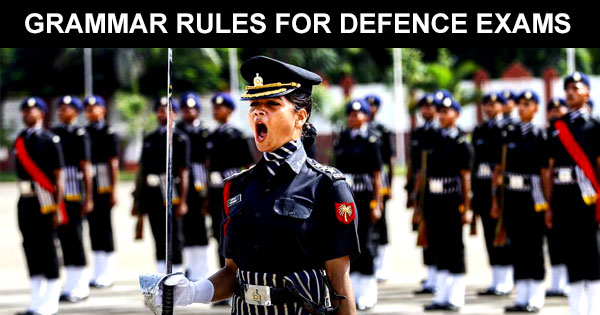English is a subject that rests on two important pillars: Grammar & Vocabulary. Therefore, to crack English paper in any defence competitive exams there are certain basic English Grammar rules that you need to know and remember. So just check out the following important Grammatical rules to solve Questions in English paper in your respective Defence exams:
- Some Collective Nouns are used with singular verbs, when used as a body or group of members.
E.g., The jury was unanimous on the verdict.
- To denote single member or individual, Collective Nouns are used with plural verbs.
E.g., The jury were divided on the final verdict.
- Sometimes collective nouns are used in plural form to denote members of different groups or communities.
E.g., Peoples of America, Cattles, etc.
- Some nouns do not change in plural form.
E.g., Sheep, Deer, Offspring, Dozen, Pair, Score, etc.
- Some nouns are used only as plural nouns.
E.g., Scissors, Spectacles, Trousers, Jeans, Pyjamas, Thanks, Tidings, etc.
- Some nouns look plural but are singular in number.
E.g., Mathematics, News, Measles, Billiards, etc.
- Plural Compound Nouns are formed by adding ‘-s’ to the principal noun.
E.g., Commanders-in-chief from Commander-in-chief, Sons-in-law from Son-in-law, Stepdaughters from Stepdaughter, Passers-by from Passer-by, etc.
- Reflexive pronoun cannot be used as a subject or object of a verb unless preceded by a noun or pronoun concerned.
E.g., Yourself and he have to complete the work. (incorrect)
You and he have to complete the work. (correct)
- ‘Both’ should be followed by ‘and’ and not by ‘as well as’.
E.g., Both you as well as my mother are going to the market. (incorrect)
Both you and my mother are going to the market. (correct)
- Singular indefinite pronoun subjects (Each, Either, Neither, One, No one, Nobody, Nothing, Anyone, Anybody, Anything, Someone, Somebody, Something, Everyone, Everybody, Everything) take singular verbs.
E.g., Everything is not fine in this world.
Someone needs to change the system.
- Plural indefinite pronoun subjects (several, few, both, many)take plural verbs.
E.g., Many are starving in this world.
- Titles of single entities (books, organizations, countries, etc.) are always singular.
E.g., ‘The Lost Symbol’ is my favourite book.
- Plural form subjects with a singular meaning (news, measles, mumps, physics, etc.) take a singular verb.
E.g., News is an important source of information in our day-to-day life.
- Plural form subjects with a plural meaning (scissors, trousers, etc.) take a plural verb.
E.g., The trousers are dirty.
- The subjunctive mood (used to express things that are hypothetical, wishful, imaginary, or factually contradictory) pairs singular subjects with what we usually think of as plural verbs.
E.g., If John were here, I would have met him.
- In indirect narration, Simple Past in Dependent Clause is changed to Past Perfect, if the Principal clause is in the Past tense.
E.g., She told me that she had planned to get married this December.
- If however some universal, habitual or generally recognized fact is mentioned in Dependent clause, the Present tense must be retained in all conditions.
E.g., He told me that the Earth moves round the Sun.
- ‘Some’ is used in affirmative sense.
E.g., I will buy some apples.
- ‘Any’ is used in negative or interrogative sense.
E.g., I will not buy any apples.
- ‘Each’ is used in speaking of one thing individually.
E.g., Each boy is given a pencil.
- ‘Every’ is used in speaking for more than one thing individually.
E.g., Every girl in the group was clever.
- ‘Little’ is used in negative sense denoting ‘not much’.
E.g., I have little concern for his well being.
- ‘A little’ is used in positive sense denoting ‘some though not much’.
E.g., A little knowledge is a dangerous thing.
- ‘The little’ denotes ‘not much, but all there is’.
E.g., The little food he had, he gave it to the beggar woman.
- ‘Few’ is used in negative sense and denotes ‘hardly any’.
E.g., Few men are free from faults.
- ‘A few’ denotes ‘some’ and is used in a positive sense.
E.g., A few people were present in the conference.
- ‘The few’ denotes ‘not many but all there are’.
E.g., The few friends he has, came for the wedding.
- No preposition is placed after verbs like Order, Request, Reach, Attack, Resemble, Emphasize, Accompany, Discuss, Investigate, Comprise, Enter, Flee, Join, Affect, Board, etc. when they are used in active voice.
- ‘So’ should be used with ‘that’ & ‘To’ with ‘too’.
E.g., They are so poor that they cannot afford shoes for their feet.
The boy was too clever to be found not guilty.
- Adverbs of manner, place and time generally come after the verb or object of the verb.
E.g., We went for the trip last week.
He didn’t want to talk continuously.
- Adverbs of frequency like Always, Ever, Never, Seldom, Frequently, etc. come before the verb they modify.
E.g., She always looks pretty in pink.
- MPT Rule : Adverbs of manner, place and time come in a single sequence.
E.g., The woman quietly left the room after receiving the bad news.
- Adverb comes before the adjective or another adverb it modifies.
E.g., The dancer was almost ready for the show.
- ‘Else’ should be followed by ‘but’ and not ‘than’.
E.g., The girl did nothing else but gossip about others.
- ‘Enough’ as an adverb is always placed after the adjective it modifies.
E.g., The girl is intelligent enough to understand the situation.
- Negative adverbs like Seldom, nowhere, never, nothing, hardly, scarcely, neither, barely, rarely, etc. should not be used with negative words.
E.g., I rarely meet anybody in the weekends.
He does nothing without ever consulting me.
- Articles are omitted –
- Before names of substances and abstract uncountable nouns.
E.g., Gold is a precious metal.
- Before plural countable nouns.
E.g., Children like chocolates.
- Before names of meals.
E.g., Dinner is ready.
- Before languages.
E.g., French is a sweet language.
- Before school, college, university, church, bed, hospital, prison, when these places are visited or used for their primary purposes.
E.g., My friend has been admitted to hospital.
- When two or more adjectives qualify the same noun, the Article is used before the first adjective only.
E.g., I have a black and white cat.
- When two or more adjectives qualify different nouns, the Article is used before each adjective.
E.g., I have a black and a white cat.
- While comparing, if two nouns refer to the same person or thing, the Article is used before the first noun only.
E.g., He is a better poet than novelist.
- ‘Scarcely’ and ‘Hardly’ should be followed by ‘when’.
E.g., Scarcely had I started for school, when my friend arrived.
Hardly had my friend arrived, when my school principal called me.
- ‘No sooner’ is followed by ‘than’.
E.g., No sooner did my friend arrive, than my school principal called me.
- ‘Though’ is followed by ‘yet’.
E.g., Though she was studious, yet she could not score well in his exams.
- In ‘Not only…but also’ sentence, the verb should agree with the noun or pronoun mentioned second.
E.g.,Not only the boy but also the girls were singing in the bus.
- ‘Unless’ means ‘if not’ and hence not used in negative sense.
E.g.,Unless you work hard, you will fail.
- ‘Lest’ expresses negativity and cannot be used with no. ‘Should’ is always used with ‘lest’.
E.g., Walk carefully, lest you should fall.
- Adjective ‘Different’ should use ‘from’ and not ‘than’.
E.g., He took a different view from mine in this case.
Download: SSB Interview eBook Set
In a nutshell, if you go through the above-mentioned 50 basic English grammatical rules and remember to apply them while you are solving and practising questions in your English paper for any defence exams, especially questions from important topics like ‘Spotting of Errors’ & ‘Sentence Improvement’, you will get a majority of the questions pertaining to the aforementioned rules. So learn them and apply them correctly and carefully, and you will be able to crack your most part of the English section in your defence exams.
Jai Hind!







